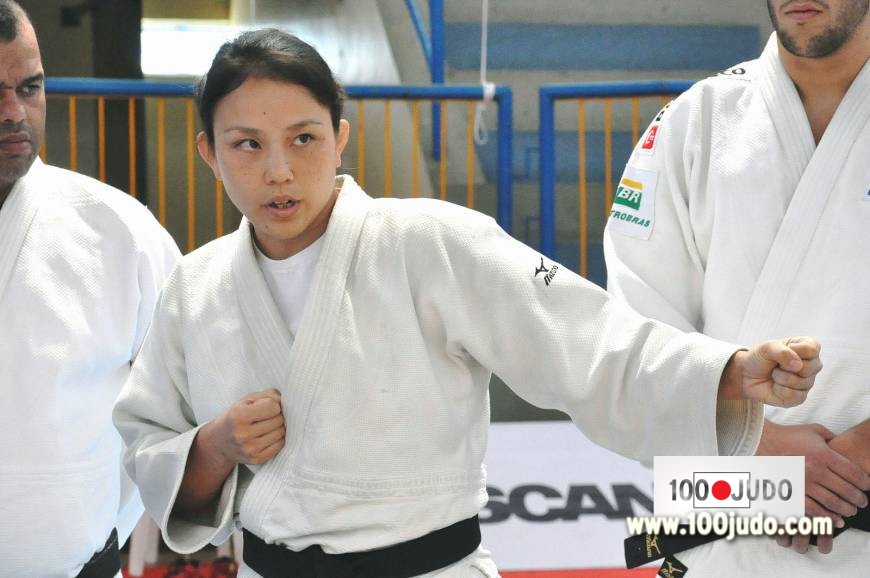Female Japanese judoka coaching Brazil team at Rio Olympics
A Japanese judo instructor working for Brazil’s national team is bringing cultural and technical experience to her pupils as they ramp up their training program for the 2016 Olympics.
“As my team members are improving their physical condition, all they need from me now is to psych them up,” Yuko Fujii, 33, said in Tokyo in December when she was in the capital with the Brazilian team for an international judo competition.
Fujii was born in Obu, Aichi Prefecture. She began practicing judo when she was 5 years old.
Although she finished third in a national tournament when she was in high school, she never reached a level that would see her qualify for a place in the Japanese Olympic team. She ended her judo career when she was 24 in 2007, around the same time as she completed graduate school in Japan and moved to the University of Bath in Britain to improve her English.

While studying in England, Fujii taught judo to students and was then recruited as a coach for Great Britain’s national team in 2010 — going on to help Gemma Gibbons win a silver medal at the 2012 Olympics in London, one of two medals the host nation won in the sport.
After the London Olympics she got married in Japan, became pregnant and then came her next coaching opportunity, again for an Olympic host nation. In May 2013, Fujii was recruited by the Brazilian Judo Federation to join the national team as a technical coach.
While pregnant, she took to her new role in Brazil with gusto, continuing to coach until a month before she gave birth to her first son, Kiyotake, who is now 2.
Japanese emigrants to Brazil have long taught judo to local people, giving them a long history with the sport that has allowed them to absorb the original teachings, such as respect for instructors, and fighting spirit. Fujii took advantage of this with her athletes, and they call her sensei (teacher).
There is no doubt the respect her athletes have for Fujii is in some measure due to her being Japanese, but she wants to be respected for her ability to teach the sport, noting she wants “sincere” respect for her abilities, no matter what her cultural heritage is.
For now, Fujii is focusing on the Rio 2016 Games, and what comes after is unclear, but she knows that she wants to use the experience gained in Britain and Brazil to continue to contribute to international exchanges through judo.
Source:www.japantimes.co.jp

WORLD RANKING LIST MEN
- -60kg
- -66kg
- -73kg
- -81kg
- -90kg
- -100kg
- +100kg
- NOC
- SURNAME, Name
- POINTS
-
1.
RUS
 Mshvidobadze, Robert
6295
Mshvidobadze, Robert
6295
-
2.
JPN
 Takato, Naohisa
5900
Takato, Naohisa
5900
-
3.
GEO
 Papinashvili, Amiran
5551
Papinashvili, Amiran
5551
-
4.
JPN
 Nagayama, Ryuju
5510
Nagayama, Ryuju
5510
-
5.
KAZ
 Smetov, Yeldos
4821
Smetov, Yeldos
4821
-
6.
MGL
 Dashdavaa, Amartuvshin
4253
Dashdavaa, Amartuvshin
4253
-
7.
UZB
 Lutfillaev, Sharafuddin
3752
Lutfillaev, Sharafuddin
3752
-
8.
ESP
 Garrigós, Francisco
3594
Garrigós, Francisco
3594
-
9.
GEO
 Chkhvimiani, Lukhumi
3505
Chkhvimiani, Lukhumi
3505
-
10.
BRA
 Takabatake, Eric
3340
Takabatake, Eric
3340

WORLD RANKING LIST WOMEN
- -48
- -52kg
- -57kg
- -63kg
- -70kg
- -78kg
- +78kg
- NOC
- SURNAME, Name
- POINTS
-
1.
FRA
 Agbegnenou, Clarisse
8150
Agbegnenou, Clarisse
8150
-
2.
SLO
 Trstenjak, Tina
6090
Trstenjak, Tina
6090
-
3.
JPN
 Tashiro, Miku
6050
Tashiro, Miku
6050
-
4.
JPN
 Nabekura, Nami
5020
Nabekura, Nami
5020
-
5.
NED
 Franssen, Juul
4953
Franssen, Juul
4953
-
6.
SLO
 Leski, Andreja
4505
Leski, Andreja
4505
-
7.
GER
 Trajdos, Martyna
4483
Trajdos, Martyna
4483
-
8.
NED
 Vermeer, Sanne
3632
Vermeer, Sanne
3632
-
9.
CAN
 Beauchemin-Pinard, Catherine
3631
Beauchemin-Pinard, Catherine
3631
-
10.
CUB
 Del Toro Carvajal, Maylin
3460
Del Toro Carvajal, Maylin
3460






























